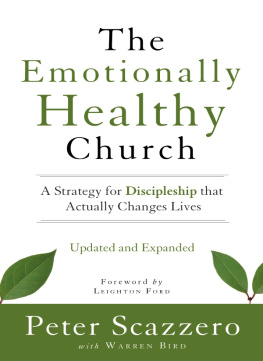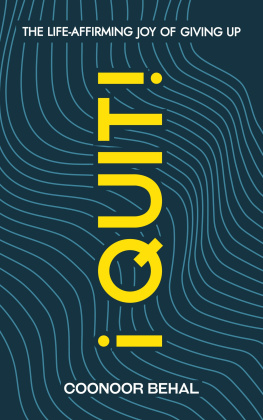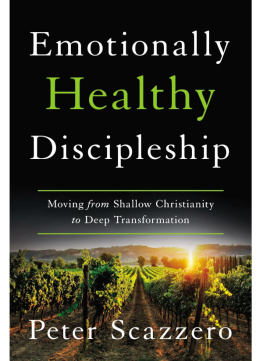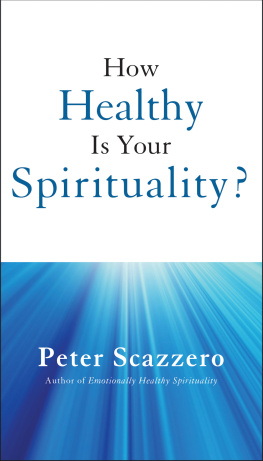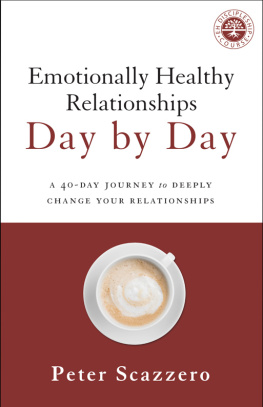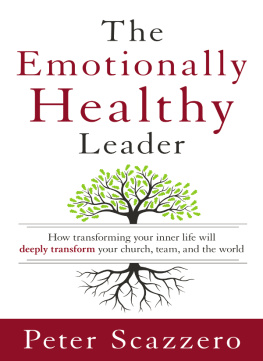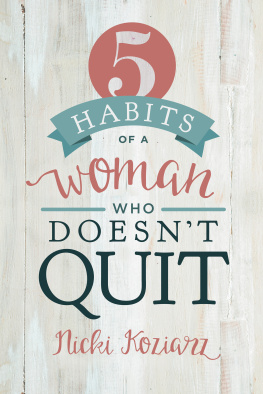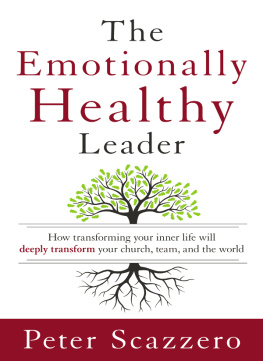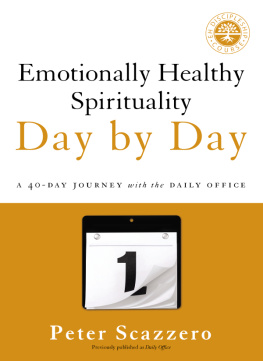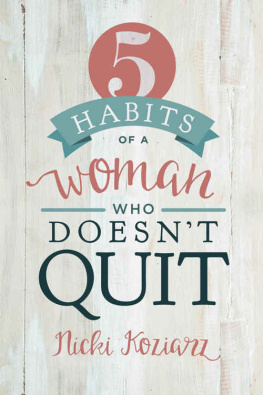The most loving thing Geri ever did for me was to quit the church I pastor. Yes, a part of me wanted to kill her for the humiliation I felt. But God used her courageous decision to change my life in profound ways.
Until now, I have been the chief beneficiary of this message, learning up close from Geri each of the Quits described in this book. Over the last seventeen years I have learned how to quit as a parent, a husband, and a pastor/leader. While initially difficult, this journey has led to a level of freedom and joy in the Christian life that I never imagined was possible.
In fact, the eight Quits described here are foundational to our spiritual formation ministries and leadership values at New Life Fellowship Church in Queens, New York. Without courageous women and men who will take up the challenge of this book, I remain doubtful about our ability to raise up healthy, biblical communities that effectively engage the world with the gospel and deeply transform lives. For this reason I am so excited that the richness and breath of this message is now available to a larger audience through this book.
I love Geri. And she is far from perfect. Nonetheless, after twenty-eight years of marriage, I can gladly affirm that she is my number-one hero. Her life is her greatest gift.
The Emotionally Healthy Woman is a book about following Jesus and summoning the courage to quit anything that does not belong to his kingdom or fall under his rule. This is not all you need to grow into a spiritually/emotionally mature adult, but one thing is sure: you cannot get there without it.
Traditionally, the Christian community hasnt placed much value on quitting. In fact, just the opposite is true; it is endurance and perseverance we most esteem. For many of us, the notion of quitting is completely foreign. When I was growing up, quitters were considered weak, bad sports, and babies. I never quit any of the groups or teams I was part of. I do remember briefly quitting the Girl Scouts, but I soon rejoined. Quitting is not a quality we admirein ourselves or in others.
The kind of quitting Im talking about isnt about weakness or giving up in despair. It is about strength and choosing to live in the truth. This requires the death of illusions. It means ceasing to pretend that everything is fine when it is not. Perpetuating illusions is a universal problem in marriages, families, friendships, and work places. Tragically, pretending everything is fine when its not also happens at church, the very place where truth and love are meant to shine most brightly.
Biblical quitting goes hand in hand with choosing. When we quit those things that are damaging to our souls or the souls of others, we are freed up to choose other ways of being and relating that are rooted in love and lead to life. For example
When we quit fear of what others think, we choose freedom.
When we quit lies, we choose truth.
When we quit blaming, we choose to take responsibility.
When we quit faulty thinking, we choose to live in reality.
Quitting is a way of putting off what Scripture calls falsehood and the old self. As the apostle Paul writes, You were taught to put off your old self and to put on the new self, created to be like God in true righteousness and holiness. Therefore each of you must put off falsehood and speak truthfully to your neighbor (Ephesians 4:2225).
When we quit for the right reasons, we are changed. Something breaks inside of us when we finally say, No more. The Holy Spirit births a new resolve within us. We rise above our fears and defensiveness. The hard soil of our heart becomes soft and ready to receive new growth and possibilities.
The Bible teaches that there is a time and season for everything under heaven (Ecclesiastes 3:1). That includes quitting. But it must be done for the right reasons, at the right time, and in the right way. Thats what this book is about.
Cutting the Rope
In 1985, Simon Yates and his climbing partner, Joe Simpson, had just reached the top of a 21,000-foot peak in Peru when disaster struck. Simpson fell and shattered his leg. As the sky grew dark and a blizzard raged, Yates tried to lower his injured friend to safety. At a certain point, however, he accidently lowered Simpson over an ice cliff, where he hung helplessly. Straining to hold his partners body in midair, Yates was faced with choosing life or death for his friend.
When he could hang on no longer, Yates had to make a hellish decision: cut the rope and save his own life, sending his partner plummeting down to certain death, or face certain death trying to save him.
Yates later related those painful moments, There was nothing I could do. I was just there. This went on for an hour and a half. My position was getting desperate I was literally going down the mountain in little jerky stages on this soft sugary snow that collapsed beneath me. Then I remembered I had a penknife. I made the decision pretty quickly really. To me it just seemed like the right thing to do under the circumstances. There was no way I could maintain where I was. Sooner or later I was going to be pulled off the mountain. I pulled the penknife out.
Yates cut the rope moments before he would have been pulled to his own death.
Certain that his partner was dead, Yates returned to base camp, consumed with grief and guilt over cutting the rope. Miraculously, however, Simpson survived the fall, crawled over the cliffs and canyons, and reached base camp only hours before Yates had planned to leave. In describing his decision to cut the rope, Yates articulates the core inner struggle for each of us to find the resolve to quit well.
I had never felt so wretchedly alone If I hadnt cut the rope, I would certainly have died. No one cuts the rope! It could never have been that bad! Why didnt you do this or try that? I could hear the questions, and see the doubts in the eyes of those who accepted my story. It was bizarre and it was cruel However many times I persuaded myself that I had no choice but to cut the rope, a nagging thought said otherwise. It seemed like a blasphemy to have done such a thing. It went against every instinct: even against self-preservation. I could listen to no rational arguments against the feelings of guilt and cowardice I resigned myself to punishment. It seemed right to be punished; to atone for leaving him dead as if simply surviving had been a crime in itself.
Quitting can feel like we are severing a lifeline, that someone, possibly even ourselves, is going to die. For this reason quitting is unthinkable to many, especially in the church. It appears bizarre and cruel. Who wants to be unpopular and rock the boat or disrupt things? I sure didnt.


